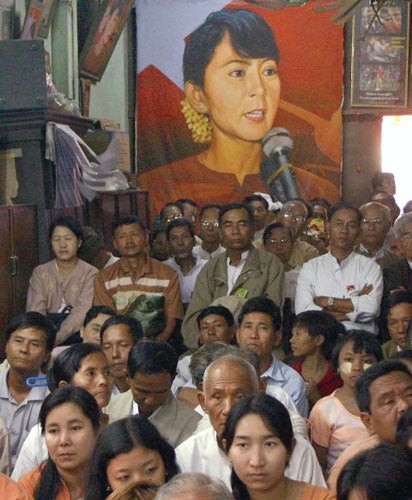How Burma's opposition lost its fear
Despite the junta's crackdown, Phoebe Kennedy finds a new mood of defiance on the streets of Rangoon

I was bumping along Rangoon's streets in a battered taxi when I saw the crowd, men and women wearing red armbands, most with heads bowed, looking uncomfortable, even frightened.
Any crowd in Burma's old colonial capital is a rarity and I asked the driver who they were. "NLD," he muttered. I asked him to stop and walked back up the street. I had not noticed it before but tucked between two shops selling cheap wooden furniture is the office of the National League for Democracy (NLD), the party of Aung San Suu Kyi, the icon of Burmese democracy and political prisoner who remains confined to her decaying lakeside home on University Avenue, a mile or so away.
The NLD was the landslide winner of elections in 1990, immediately annulled by the ruling military to keep themselves in power. In the 18 intervening years, depressingly little has changed in Burma's political landscape.
U Hla Tin introduced himself as a member of parliament (who has never taken up his seat) and steered me through the overspill of NLD members on the pavement. The crowd of about 80 people was braving not just the glare of Burma's midday sun but the scrutiny of watching plain-clothed military intelligence officers across the street.
A recent flurry of lengthy jail sentences meted out to Burmese dissidents made their simple decision to come out to support their party a stunningly brave one. In recent months, hundreds of activists, along with journalists, bloggers, a comedian and a hip hop star have been handed decades-long sentences and dispatched to remote jails across the Burmese gulag.
"Aren't you scared?" I asked the MP. "No," he said with a smile. "We don't care." He and his colleagues had faced up to the worst that could happen to them, it seemed, and were no longer afraid.
Inside, in a gloomy shop-cum-house, with yellowing walls and ceiling fans whirring, it was hard to believe we were in the offices of the party which should be running a country of more than 50 million. I was ushered to a plastic chair near the front.
U Hla Pe, a member of the NLD central executive committee, read dryly from a written speech calling for political prisoners to be released and for the junta to implement an urgent review of a new constitution which enshrines their role in any future elected government.
A woman in the audience, her greying hair pinned back, wiped away silent tears as she listened to demands that are unlikely ever to be met. U Hla Pe finished, took a sip from his water glass, his hand shaking, and was helped down from the wooden podium. He rejoined the NLD top brass seated behind him; two rows of noble, elderly men, their political dreams reduced to empty protocol.
The NLD has been criticised for its lack of direction and new ideas. Not surprising, given that most of its best political minds are behind bars. And communication with Ms Suu Kyi, under house arrest, is impossible, said U Hla Tin. "We don't speak to her, we don't hear from her, no no no," he shook his head. "How can we know what she's thinking?"
Rudderless and reduced by imprisonments, the remnants of Suu Kyi's party are trying to decide whether to contest elections set for 2010. There is almost no prospect of a fair vote, Burma's generals will no doubt ensure that their puppet civilian organisation, the Union Solidarity and Development Association (USDA) will form the winning party. But the NLD's refusal to engage with the military's stage-managed "road-map to democracy" means the party risks becoming isolated and irrelevant as the years tick by.
Some of Ms Suu Kyi's supporters want a change of tactic. According to the online bulletins of Burma's exiled opposition, calls for greater engagement in the military's skewed political process are led by the veteran journalist and NLD executive U Win Tin, released in September after 19 years in jail. Reports say pressure has been added by Western diplomats who have met privately with NLD leaders to urge them to participate.
But the party rank and file are circumspect. "In the West you always talk of a level playing field," said another disenfranchised MP. "Here our game is played on the side of a mountain."
They streamed out of the meeting, walking in pairs or small groups to catch an ancient bus or taxi home. They kept their heads down, with wary sideways glances at the men across the street.
Join our commenting forum
Join thought-provoking conversations, follow other Independent readers and see their replies
Comments
Bookmark popover
Removed from bookmarks